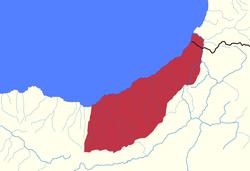Lazistan Lazona | |
|---|---|
Historical region | |
.jpg) | |
 Historical Lazistan | |
| Country | |
| Largest city | Rize |
| Lazistan is not an official subdivision of either Georgia or Turkey; it constitutes a historical region only. | |
Lazistan (Laz: ლაზონა, romanized: Lazona; Georgian: ლაზეთი, or ჭანეთი Ç'aneti; Ottoman Turkish: لازستان, romanized: Lazistān) is a historical and cultural region of the Caucasus and Anatolia, traditionally inhabited by the Laz people, located mostly in Turkey, with small parts in Georgia. Its area is about 7,000 km2 (2,703 sq mi), and its population about 500,000. Geographically, Lazistan consists of a series of narrow, rugged valleys extending northward from the crest of the Pontic Alps (old name is Lazistan mountains, Lazic Alps) (Turkish: Anadolu Dağları), which separate it from the Çoruh valley, and stretches east-west along the southern shore of the Black Sea. Lazistan is a virtually a forbidden term in Turkey.[A] The designation of the term of Lazistan was officially banned in 1926, by Kemalists, as the name was considered to be an 'unpatriotic' invention of ancien regime.[1] However, Recep Tayyip Erdoğan reportedly said in 2013, that the Ottoman Empire used to call the Black Sea Region Lazistan.[2]
Etymology
The ethnonym "Laz" is unhesitatingly linked to a Svan toponym Lazan (i.e. the territorial prefix la- + Zan, "land of the Zan"). The suffix -stan (Persian: ـستان, translit. stân) is Persian for region. Literal translation "Region of Lazs". "Lazistan" was also formerly spelled Lazica or Lazia.
History
Antiquity
Medieval
The Ottoman era
Modern
See also
- Lazistan Sanjak
Notes
- ^ "Article 8 of the Anti-Terror Law (Law No. 3713 amended by Law No. 4126) reads, "No one may engage in written and oral propaganda aimed at disrupting the indivisible integrity of the State of the Turkish Republic, country, and nation. [… ] Those who engage in such deeds will be sentenced to from one to three years in prison and given a heavy fine […]". This article means that those who orally or in print make use of words such as Lazistan or Kurdistan risk prosecution."
References
- ^ Thys-Senocak, Lucienne (2017-03-02). Ottoman Women Builders. doi:10.4324/9781315247472. ISBN 9781315247472.
- ^ hurriyetdailynews.com - Politicians hit below belt in Kurdish debate